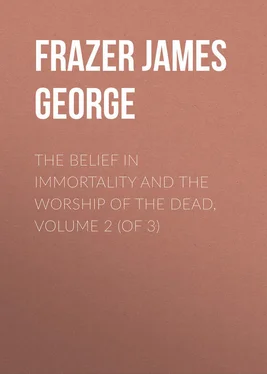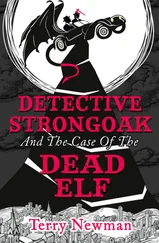James Frazer - The Belief in Immortality and the Worship of the Dead, Volume 2 (of 3)
Здесь есть возможность читать онлайн «James Frazer - The Belief in Immortality and the Worship of the Dead, Volume 2 (of 3)» — ознакомительный отрывок электронной книги совершенно бесплатно, а после прочтения отрывка купить полную версию. В некоторых случаях можно слушать аудио, скачать через торрент в формате fb2 и присутствует краткое содержание. Жанр: foreign_antique, foreign_prose, на английском языке. Описание произведения, (предисловие) а так же отзывы посетителей доступны на портале библиотеки ЛибКат.
- Название:The Belief in Immortality and the Worship of the Dead, Volume 2 (of 3)
- Автор:
- Жанр:
- Год:неизвестен
- ISBN:нет данных
- Рейтинг книги:3 / 5. Голосов: 1
-
Избранное:Добавить в избранное
- Отзывы:
-
Ваша оценка:
- 60
- 1
- 2
- 3
- 4
- 5
The Belief in Immortality and the Worship of the Dead, Volume 2 (of 3): краткое содержание, описание и аннотация
Предлагаем к чтению аннотацию, описание, краткое содержание или предисловие (зависит от того, что написал сам автор книги «The Belief in Immortality and the Worship of the Dead, Volume 2 (of 3)»). Если вы не нашли необходимую информацию о книге — напишите в комментариях, мы постараемся отыскать её.
The Belief in Immortality and the Worship of the Dead, Volume 2 (of 3) — читать онлайн ознакомительный отрывок
Ниже представлен текст книги, разбитый по страницам. Система сохранения места последней прочитанной страницы, позволяет с удобством читать онлайн бесплатно книгу «The Belief in Immortality and the Worship of the Dead, Volume 2 (of 3)», без необходимости каждый раз заново искать на чём Вы остановились. Поставьте закладку, и сможете в любой момент перейти на страницу, на которой закончили чтение.
Интервал:
Закладка:
As our subject is the belief in immortality and the worship of the dead, we are not directly concerned with the original Tongan deities who were believed never to have been men. But since their functions and worship appear to have been in certain respects closely analogous to those of the inferior deities, the souls of the dead, some notice of them may not be out of place, if it helps to a fuller understanding of what we may call the human gods. Besides, we must always bear in mind that some at least of the so-called original gods may have been men, whose history and humanity had been forgotten. We can hardly doubt that the celestial hierarchy has often been recruited by the souls of the dead.
The original and superior gods, Mariner tells us, were thought to be rather numerous, perhaps about three hundred all told; but the names of very few of them were known, and even those few were familiar only to some of the chiefs and their ministers, the matabooles ; "for it may easily be supposed," says Mariner, "that, where no written records are kept, only those (gods) whose attributes particularly concern the affairs of this world should be much talked of; as to the rest, they are, for the most part, merely tutelar gods to particular private families, and having nothing in their history at all interesting, are scarcely known to anybody else." 181 181 W. Mariner, Tonga Islands , ii. 104.
Among these original and superior deities was Tali-y-Toobo, the patron god of the civil king and his family. He was the god of war and was consequently always invoked in time of war by the king's family; in time of peace prayers were sometimes offered to him for the general good of the nation as well as for the particular interest and welfare of the royal house. He had no priest, unless it was the king himself, who was occasionally inspired by him; but sometimes a whole reign would pass without the king being once favoured with the divine afflatus. 182 182 W. Mariner, Tonga Islands , ii. 105.
Another god was Tooi fooa Bolotoo, whose name means "Chief of all Bolotoo." From this it might be supposed that he was the greatest god in Bolotoo, the home of the gods and of the deified spirits of men; but in fact he was regarded as inferior to the war god, and the natives could give no explanation of his high-sounding title. He was the god of rank in society, and as such he was often invoked by the heads of great families on occasion of sickness or other trouble. He had several priests, whom he occasionally inspired. 183 183 W. Mariner, Tonga Islands , ii. 105 sq.
Another great god was Toobo Toty, whose name signifies "Toobo the mariner." He was the god of voyages, and in that capacity was invoked by chiefs or anybody else at sea; for his principal function was to preserve canoes from accidents. Without being himself the god of wind, he had great influence with that deity, and was thus enabled no doubt to save many who were in peril on the great deep. 184 184 W. Mariner, op. cit. ii. 106 sq.
Another god was Alo Alo, whose name means "to fan." He was the god of wind and weather, rain, harvest, and vegetation in general. When the weather was seasonable, he was usually invoked about once a month to induce him to keep on his good behaviour; but when the weather was unseasonable, or the islands were swept by destructive storms of wind and rain, the prayers to him were repeated daily. But he was not supposed to wield the thunder and lightning, "of which, indeed," says Mariner, "there is no god acknowledged among them, as this phenomenon is never recollected to have done any mischief of consequence." 185 185 W. Mariner, op. cit. ii. 108.
From this it would appear that where no harm was done, the Tongans found it needless to suppose the existence of a deity; they discovered the hand of a god only in the working of evil; fear was the mainspring of their religion. In boisterous weather at sea Alo Alo was not invoked; he had then to make room for the superior god, Toobo Toty, the protector of canoes, who with other sea gods always received the homage of storm-tossed mariners. However, Alo Alo, the weather god, came to his own when the yams were approaching maturity in the early part of November. For then offerings of yams, coco-nuts, and other vegetable products were offered to him in particular, as well as to all the other gods in general, for the purpose of ensuring a continuation of favourable weather and consequent fertility. The offering was accompanied by prayers to Alo Alo and the other gods, beseeching them to extend their bounty and make the land fruitful. Wrestling and boxing matches formed part of the ceremony, which was repeated eight times at intervals of ten days. The time for the rite was fixed by the priest of Alo Alo, and a curious feature of the ceremony was the presence of a girl of noble family, some seven or eight years old, who represented the wife of Alo Alo and resided in his consecrated house during the eighty days that the festal season lasted. 186 186 W. Mariner, Tonga Islands , ii. 205-208; compare id. 7, note *, 108.
Another god named Móooi was believed to support the earth on his prostrate body. In person he was bigger than any other of the gods; but he never inspired anybody, and had no house dedicated to his service. Indeed, it was supposed that this Atlas of the Pacific never budged from his painful and burdensome post beneath the earth. Only when he felt more than usually uneasy, he tried to turn himself about under his heavy load; and the movement was felt as an earthquake by the Tongans, who endeavoured to make him lie still by shouting and beating the ground with sticks. 187 187 W. Mariner, op. cit. ii. 112 sq. Compare Captain James Wilson, Missionary Voyage to the Southern Pacific Ocean (London, 1799), pp. 277 sq. Móooi is the Polynesian god or hero whose name is usually spelled Maui. See Horatio Hale, United States Exploring Expedition, Ethnography and Philology , p. 23; E. Tregear, Maori-Polynesian Comparative Dictionary , pp. 233 sqq. s. v. "Maui."
Similar attempts to stop an earthquake are common in many parts of the world. 188 188 Adonis, Attis, Osiris , i. 197 sqq.
Tangaloa was the god of artificers and the arts. He had several priests, who in Mariner's time were all carpenters. It was he who was said to have brought up the Tonga islands from the bottom of the sea at the end of his fishing line; 189 189 W. Mariner, Tonga Islands , ii. 109, 114 sq. ; Horatio Hale, United States Exploring Expedition, Ethnography and Philology , pp. 24 sq.
though in some accounts of Tongan tradition this feat is attributed to Maui. 190 190 Jérôme Grange, in Annales de la Propagation de la Foi , xvii. (1845) p. 11; Charles Wilkes, Narrative of the United States Exploring Expedition , iii. 23; Sarah S. Farmer, Tonga and the Friendly Islands , p. 133. According to this last writer it was only the low islands that were fished up by Maui; the high islands were thrown down from the sky by the god Hikuleo.
The very hook on which he hauled up the islands was said to be preserved in Tonga down to about thirty years before Mariner's time. It was in the possession of the divine chief Tooitonga; but unfortunately, his house catching fire, the basket in which the precious hook was kept perished with its contents in the flames. When Mariner asked Tooitonga what sort of hook it was, the chief told him that it was made of tortoise-shell, strengthened with a piece of whalebone, and that it measured six or seven inches from the curve to the point where the line was attached, and an inch and a half between the barb and the stem. Mariner objected that such a hook could hardly have been strong enough to support the whole weight of the Tonga islands; but the chief replied that it was a god's hook and therefore could not break. The hole in the rock in which the divine hook caught on the memorable occasion was shown down to Mariner's time in the island of Hoonga. It was an aperture about two feet square. 191 191 W. Mariner, Tonga Islands , i. 272, ii. 114 sq. The Catholic missionary Jérôme Grange was told that the hook in question existed down to his time (1843), but that only the king might see it, since it was certain death to anybody else to look on it. See Annales de la Propagation de la Foi , xvii. (1845) p. 11.
Интервал:
Закладка:
Похожие книги на «The Belief in Immortality and the Worship of the Dead, Volume 2 (of 3)»
Представляем Вашему вниманию похожие книги на «The Belief in Immortality and the Worship of the Dead, Volume 2 (of 3)» списком для выбора. Мы отобрали схожую по названию и смыслу литературу в надежде предоставить читателям больше вариантов отыскать новые, интересные, ещё непрочитанные произведения.
Обсуждение, отзывы о книге «The Belief in Immortality and the Worship of the Dead, Volume 2 (of 3)» и просто собственные мнения читателей. Оставьте ваши комментарии, напишите, что Вы думаете о произведении, его смысле или главных героях. Укажите что конкретно понравилось, а что нет, и почему Вы так считаете.











